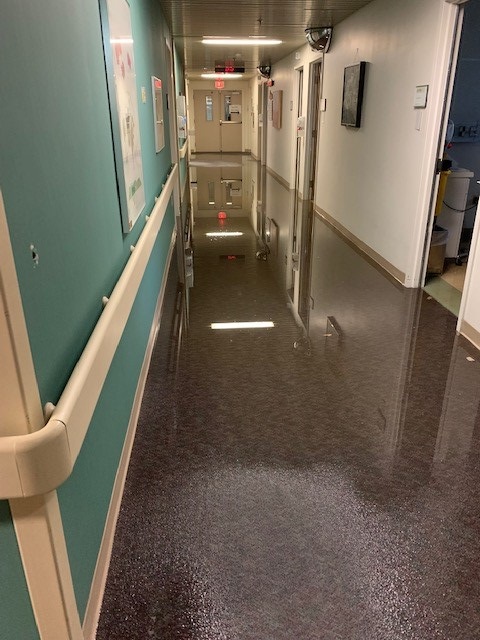It will still be some time before things are back to normal for the London Regional Cancer Program at Victoria Hospital following “significant” water damage from a broken pipe.

On Aug. 24, a pipe burst on the second floor of Victoria Hospital and water ran for a period of time, causing damage to the first and second floors of the London Regional Cancer Program.
Although the cause of the broken pipe is not known, London Health Sciences Centre (LHSC) is now sharing more information on the scope of the damage and the impact it continues to have on patient care.
LHSC staff report that there was a lot of damage to the clinical area where oncologists see patients and to the areas for radiation treatment.
“This is a significant blow to our ability to treat patients, essentially 50 per cent of our clinic spaces are removed, 50 per cent of our treatment capability has been removed, our ability to plan has been compromised,” said Dr. Michael Lock, LHSC radiation oncologist.

Addressing the damage, the clinic area has been moved to other areas of the hospital for the next few weeks and some of the imaging is also moved to other areas of the hospital.
“We also have been relying on the specialized equipment at Grand River Hospital and they were ready to go, and in a number of days patients were going there,” said Tom McHugh, clinical vice-president at London Health Science Centre.
For radiation treatment, McHugh said five of their nine machines were lost on the first day, but they have since been able to get one more operational and expect to get two more operational by the end of the week.
“It was a pretty massive loss of infrastructure,” McHugh said.
- Canadian man dies during Texas Ironman event. His widow wants answers as to why
- ‘Sciatica was gone’: hospital performs robot-assisted spinal surgery in Canadian first
- Canadians more likely to eat food past best-before date. What are the risks?
- Treatment from female doctors leads to lower death rates, study finds
McHugh is praising staff for their continued hard work, in some cases working until midnight to treat patients on the remaining radiation machines to ensure everyone gets the treatment they need.
For two weeks LHSC is requesting that physicians stop referring new radiation consults, and either send them elsewhere or see if they can wait for two weeks while they get things up and running again.
“We acknowledge how difficult this is for patients,” McHugh said.
“There have been a variety of ways to provide continuity of care where we have had to send patients in different directions, either in our own building or outside the building and we do apologize for all of that.”
Lock said they are grateful to Grand River Hospital and other cancer care centres across the province for stepping up to ensure all their patients have continued care.









Comments